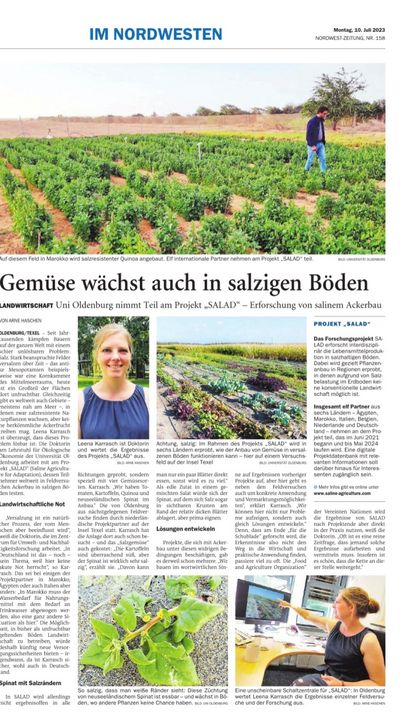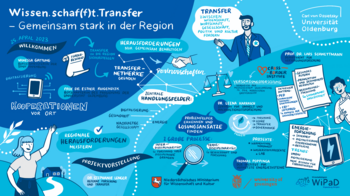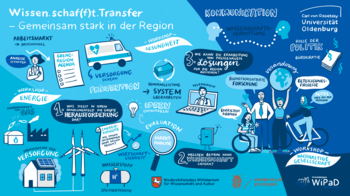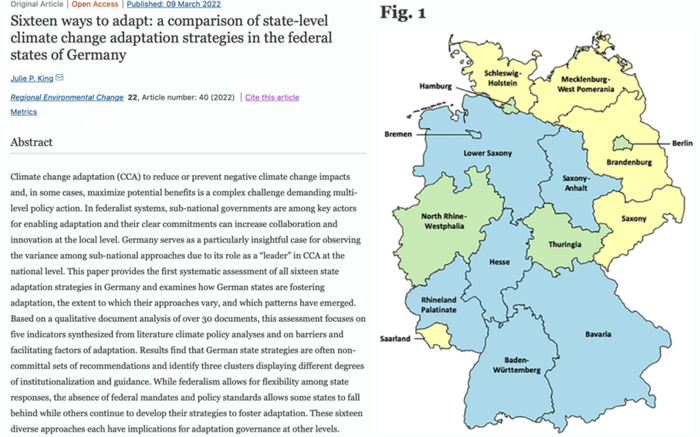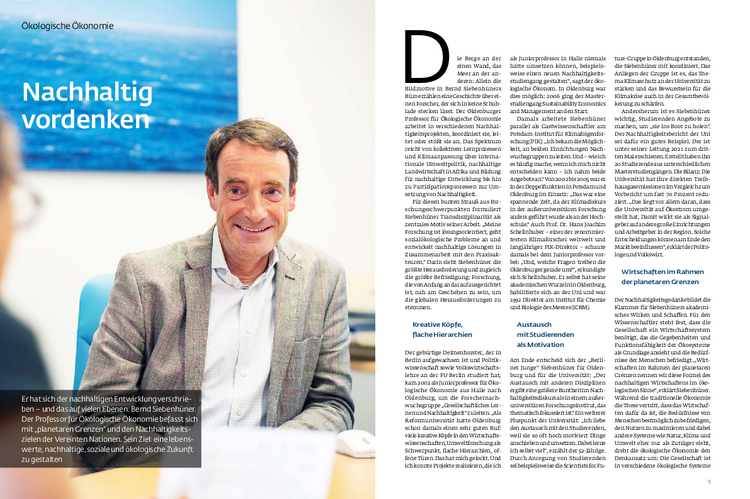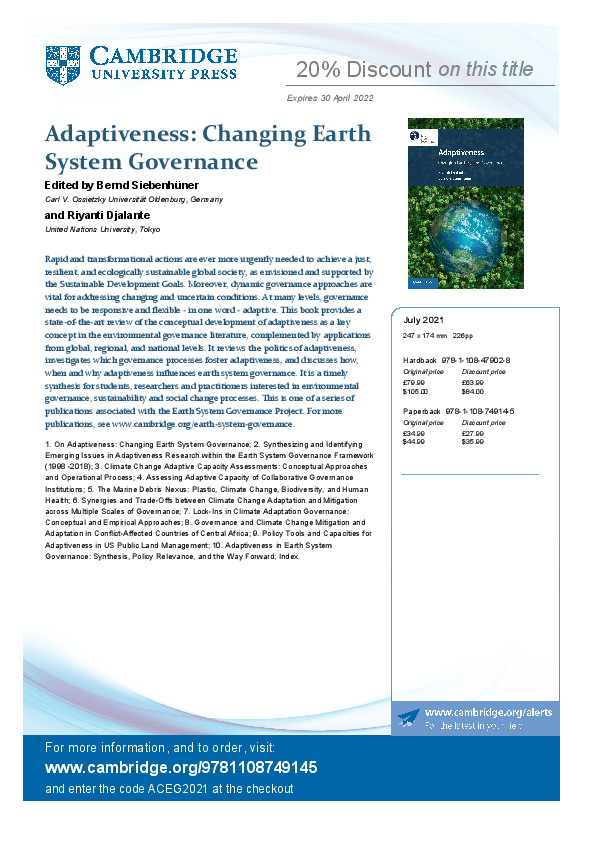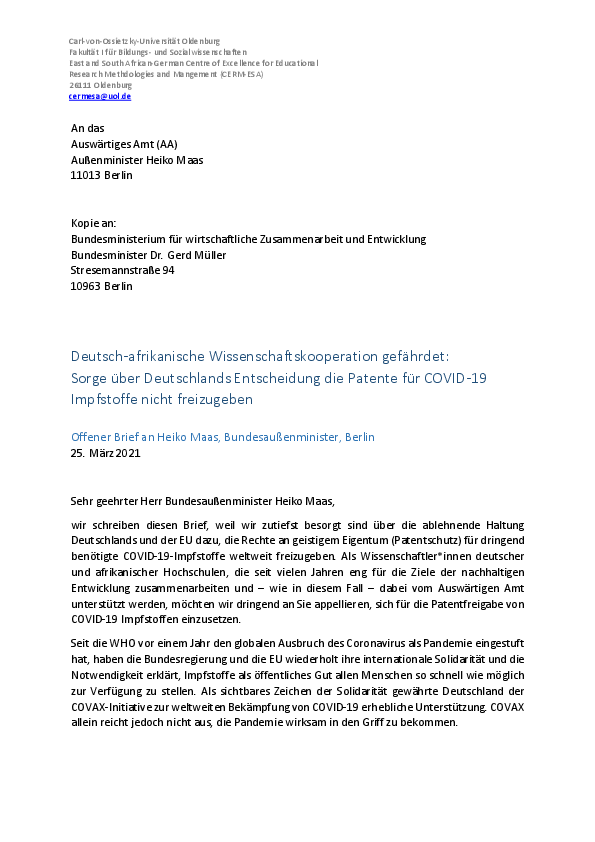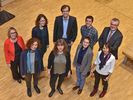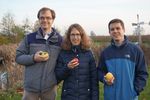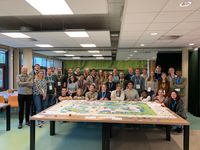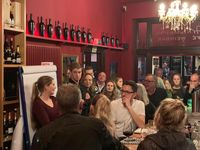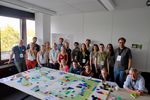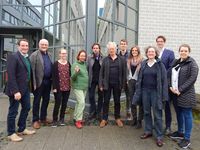Archive
Archive
2023
Sophie Berg and Hendrik Wolter win the teaching prize
The teaching prize was awarded in various categories at the University of Oldenburg on November 30th. The chair members Sophie Berg and Hendrik Wolter received the prize in the “Research-based Learning” category for their module “Research Workshop: Dilemmas of Sustainability”. The module can be taken as a supplementary module in various master's programs at the Department of Economics and Law. In the research workshop, students learn to design, plan and organize a research project in the area of sustainability dilemmas. Central to this is the implementation of an intensive “research week”.
Here the award winners introduce themselves and their event:
Interview with Leena Karrsch and Evke Schulte-Güstenberg in the article “From Gray to Green: How Building With Nature May Save Our Fragile Coastlines”
ZME Science reports on ecosystem-based coastal adaptation in the article “From Gray to Green: How Building With Nature May Save Our Fragile Coastlines”. Leena Karrasch and Evke Schulte-Güstenberg also report on coastal protection on the Lower Saxony coast and the Langwarder Groden. The article is also available as a short film.
Helleheide closing ceremony on September 22nd & 23rd, 2023
The new Helleheide district is being created and with the “ENaQ” project we have made an initial contribution to making it intelligent, green and sustainable. Well, at the end of the “ENaQ” project period, we would like to celebrate on September 22nd and 23rd, 2023 on the grounds of the Alte Fleiwa!
On Friday, September 22nd, we invite interested experts from business, science, education and politics to discuss the successes, challenges and findings from the six years of the project. We would like to talk to you about the project's focus on citizen participation, digitalization and energy supply and, in workshop sessions, discuss the question of what the future of urban development looks like and what contribution the project could make to this.
What to Expect: 9:30 a.m. start Welcome by Jürgen Krogmann, Mayor of Oldenburg Outlook for the air base – Stefan Könner, Managing Director GSG-Oldenburg Keynote – Nicole Pillen, Head of “Urban Energy Transition”, Deutsche Energie-Agentur GmbH (dena) ENaQ reflections - Sebastian Lehnhoff, Chairman of the Board OFFIS - Institute for Computer Science 1:00 p.m. workshop sessions 4:00 p.m. end
Design report on successful transdisciplinary research
Based on their experiences in the transdisciplinary research project EGON Stefanie Sievers-Glotzbach, Hendrik Wolter and Bernd Siebenhüner published a design report on successful transdisciplinary research in the journal GAiA. To the article
Abstract: Evaluations on transdisciplinary research suggest that co-creation should place greater emphasis on the first steps of co-design. This report provides insights and reflections on a sustainable fruit breeding project initiated by practitioners. The research project EGON explored a new organizational approach in the fruit sector that builds upon common ownership and collective management: commons-based organic fruit breeding. As agricultural and breeding actors initiated the writing of the research proposal, they became involved on equal footing in the joint problem framing and design of the research project from the very start. In this Design Report, we explore contextual factors in the co-design and co-production phase and their influence on the research process, as well as scientific and societal effects. Based on interviews with scientific and practitioner partners in the consortium, we find that early and continuous professional networking with practitioners is essential for fruitful transdisciplinary research processes. Also, joint activities like common excursions, seminars, and joint conference presentations have been valuable to develop mutual understanding, curiosity, and trust. What turned out to be crucial for the commons-based approach of the project were adequate funding opportunities for practitioners in systematic and scientifically supported breeding processes.
Newspaper article “Spinach from salty soil helps fight world hunger”
The NWZ reports on Leena Karrasch's SALAD research project in the article “Spinach from salty soils helps against world hunger”.
Nobody has to salt this spinach anymore: A research project is growing resistant vegetables in fields where conventional crops cannot grow. The result gives hope – and tastes salty.
New publications from the “Dilemmas of Sustainability” project
The concept of sustainability is increasingly losing its contours. Against this background, this guide provides the opportunity to reflect on the understanding of sustainability used in research and science and thus to specifically determine the specific contribution to sustainability, but also the associated limits. Starting from an analytical understanding of sustainability and clarifying the basic structure of practical dilemmas, the guide identifies typical conflicts as the cause of dilemmas. Meta-criteria of sustainability allow early identification, clarification and processing of dilemmas to be supported. These are then operationalized using reflection guidelines for application in specific project contexts.
New COST action on saline soils
Following on from the SALAD project and with the participation of Leena Karrasch, a COST action was successfully launched. This COST Action aims to build a global transdisciplinary network of scientific experts and committed stakeholders in the area of saline soils and in the context of food security, sustainability and the worsening climate crisis. Activities will focus on:
- Understanding responses to heterogeneous soil salinization
- Building a knowledge base to improve water and soil management and crop production on saline-contaminated soils
- Demonstrating the overall value of saline soils and saline landscapes
- Networking of various interest groups involved in saline agriculture
- Develop targeted policy frameworks for an appropriate management of salinization in order to include saline agriculture as a complementary component in the European agenda for food security in salt-affected coastal and inland areas.
More Information here: Action CA22144 - COST
New publication: Groundwater salinization in northwestern Germany
Groundwater salinization in the North Sea region is a problem that has so far received little consideration in decision-making processes. This article examines governance processes, actor perspectives and responses to groundwater salinization: What type of anticipatory governance approach can be found among actors in the study region in relation to groundwater salinization and climate adaptation? How to promote proactive governance processes that address the complex issue of groundwater salinization in terms of awareness raising, strategies and policy actions?
Talk about Promoting Agricultural Insurance as Climate Change Adaptation Strategy
Fred Alinda, PhD student at our Chair of Ecological Economics, is going to give a talk about Promoting Agricultural Insurance as Climate Change Adaptation Strategy: Addressing the Institutional and Socio-economic Barriers to Insurance Demand and Supply on June, 7th at 4pm in A5 1-136a, University of Oldenburg.
The talk will take place in a hybrid format. More information and the link for the talk can be accessed here.
Papenburg-Dörpen economic region: Support from science
The opening event !Wissenschaf(f)t Transfer took place in Papenburg on April 26th, 2023. The University of Oldenburg and the Rijksuniversiteit Groningen, together with representatives from politics, administration, business and associations, have given the starting signal for the project “Wissen.schaf(f)t.Transfer – Strong together in the region”. Leena Karrasch gave a keynote speech on the topic of “Sustainable Society”.
Oldenburg. The University of Oldenburg and the Rijksuniversiteit Groningen, together with representatives from politics, administration, business and associations, gave the starting signal for a new transfer project at the Papenburg Historical-Ecological Education Center. Under the motto “Wissen.schaf(f)t.Transfer – Strong together in the region”, those involved want to solve regional challenges in collaboration with science – for example in the areas of energy, health and a sustainable society. The Lower Saxony Ministry of Science is funding the three-and-a-half-year project, which is intended to make scientific findings usable more quickly, with 300,000 euros from funds from the Volkswagen Foundation.
Guided tours of the Oldenburg Air Base
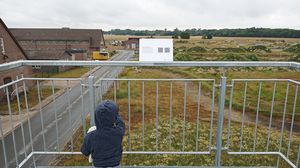
As part of the Energetic Neighborhood Quarter (ENaQ) project, a tour of the Oldenburg Air Base took place on March 28, 2023. The project employees Stefanie Brinkmann-Gerdes (GSG Oldenburg) and Maren Wesselow (University of Oldenburg) gave interested citizens an overview of the history and current plans on the former airport site in the north of Oldenburg. A special focus of the approximately one-hour tour was on the Helleheide district, where the energetic neighborhood district is currently being built. The tour was attended by 14 guests and accompanied by the Oldenburg local broadcaster Oeins (https://youtu.be/tRYF9IWALAE after minute 16).
The ENaQ project invites all interested citizens to further tours of the site on the following dates:
- 21.4.2023, 16 Uhr
- 11.5.2023, 11 Uhr
- 17.6.2023, 13 Uhr
- 23.8.2023, 17 Uhr
- 26.9.2023, 17 Uhr
- 16.10.2023, 11 Uhr
Newspaper article on “Finding ways to keep Oldenburg livable”
Leena Karrasch researches sustainability and climate adaptation. In the interview she talks about the consequences of climate change for Oldenburg and the city's need for action.
Continue Reading
Newspaper article on “Protecting the coast together”
Oldenburg - How can we live well with the effects of climate change on the German North Sea coast? In order to develop possible solutions, Dr. Leena Karrasch from the University of Oldenburg brought all actors together at one table.
“Right at the beginning of every project, we bring together everyone involved, such as politicians, farmers, tourism experts, conservationists and spatial planners, so that everyone gets to know the wishes and concerns of others. “If we understand each other, it’s easier to develop solutions together,” says the 37-year-old. “We always look for positive compromises that, if possible, everyone can live with.”
Continue Reading
Book publication,Sustainable Apple Breeding and Cultivation in Germany“
Hendrik Wolter has published research work from recent years in the monograph “Sustainable Apple Breeding and Cultivation in Germany. Commons-based Agriculture and Social-ecological Resilience” published. The book was published by Routledge and is available as an e-book and hardcover.
New Publication: Design and Insights Gained in a Real-World Laboratory for the Implementation of New Coastal Protection Strategies
Novel coastal protection strategies are needed to address sea level rise caused by climate change. They aim at the sustainable development of coastal areas in the face of intensification and changes in land use. A promising approach is the development of nature-based solutions (NbS) that complement the security level of the technical infrastructure. However, NbS lacks widespread and large-scale implementation. In order to remedy this deficit, co-design concepts are needed that combine experiences from science and practice. In this work, the approach of a coastal-specific real-world laboratory (RwL) is presented and discussed, which deals with the integrative design of ecosystem-based coastal protection. RwLs strategies are being applied for the first time in a coastal context along the German North Sea coast. We have found that the concept of RwLs is suitable for transdisciplinary coastal research, even if adjustments in the spatial reference level or flexibility in the place and time of the experiments are necessary. A well-founded actor analysis is essential to specify participatory processes and interaction levels. A criteria-based cooperative selection of RWL sites helps to uncover and resolve conflicts of interest to create trust between science and practice. Taking into account site-specific characteristics and the needs of practitioners, our coastal RwL offers a space for mutual learning to develop and test NbS as a complement to technical coastal protection.
2022
SALAD Webinar - Upscaling Food Production on Salt-degraded Lands

When? → 17 October 2022 from 3 to 6 p.m. Where? → online
What? Three main sessions cover different aspects of the SALAD project each topic will be discussed by a different expert. You can find the detailled program below.
1 Salinisation and Saline agriculture Chair: Giulia Atzori 15:00 - 15: 15 Introduction - Kate Negacz 15:15 - 15:30 International Network on Salt-Affected Soils (INSAS) - Jorge Batlle-Sales 15:30 - 15:45 Sea level rise and Salinization: a Coupled Climate Change Challenge for Agriculture Adpatation Strategies - Federico Martellozzo
2.Plant physiology Chair: Giulia Atzori & Pim Van Tongeren 15:45 - 16:00 How do quinoa responds to organic amendments under salinity and deficit irrigation conditions: a synthesis of three experiments - Abdelaziz Hirich 16:00 - 16:15 Monitoring root-felt salt accumulation in New Zealand spinach and quinoa with rhizoslides - Diego Comparini & Louis Thiers 16:15 - 16:30 How does salinity affect the growth and physiology of the New Zealand spinach in two different soil conditions - Giulia Atzori and Giulia Mozzo
3.Political science, economics & commerce Chair: Filippo Randelli & Federico Martellozzo 16:45 - 17:00 Policies for saline agriculture: an evolving landscape - Lucia Ferrone 17:00 - 17:15 Saline agriculture initiatives in Mediterranean and North Sea Region - Kate Negacz & Pim van Tongeren 17:15 - 17:30 Mapping the institutional complexity of saline agriculture initiatives based on network theory - Pim van Tongeren 17:30 - 17:45 Consumer's perception vis-a-vis quinoa food products in Morocco: case of Laayoune region - Abdelaziz Hirich 17:45 - 18 :00 Mapping relevant stakeholders along quinoa value chain in Morocco - Obiageli Umeugochukwu
Official handover of the funding decision "Future Proof Grasslands" by Björn Thümler in Ovelgönne
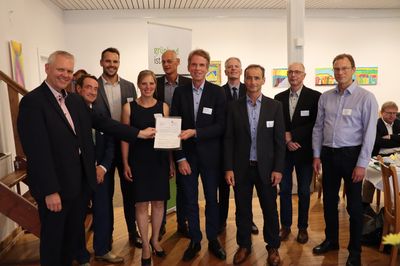
Grassland shapes the cultural landscape in the north-west German coastal region. Grasslands provide a variety of services that people derive from these ecosystems. These so-called ecosystem services range from the provision of native fodder for animal husbandry to contributions to species, water and climate protection to recreational and leisure benefits for society.
Lower Saxony's Minister for Science and Culture Björn Thümler (l.) hands over the funding notification of 5.13 million euros to Prof. Bernd Siebenhüner (University of Oldenburg), Mathias Paech (Grassland Centre, project leader), Dr Leena Karrasch (University of Oldenburg), Dr Helge Bormann (Jade University) and Dr K. K. Bormann (Jade University). Helge Bormann (Jade University of Applied Sciences), Prof. Ingo Mose (University of Oldenburg, deputy project spokesperson), Prof. Guido Recke (Osnabrück University of Applied Sciences), Dr Arno Krause (Grassland Centre, project spokesperson), Dr Manfred Kayser (University of Göttingen) and Dr Jan Thiele (Thünen Institute).
Presentation at the ISPIM Innovation Conference
Together with two colleagues from the ENaQ project held Maren Wesselow (Chair of Ecological Economics) gave a presentation on 8 June 2022 at the ISPIM innovation conference (ISPIM Innovation Conference 2022).
ISPIM, the International Society for Professional Innovation Management, consists of members from research, industry, consulting and the public sector. This year's ISPIM conference was held in Copenhagen under the title "Innovating in a Digital World". The four-day conference attracted a total of 450 participants from 40 countries and 270 presentations from academia and practice.
The presentation entitled "Responsible innovations through a participatory process design" looked at different ideas developed in the ENaQ project and explored why these ideas were discarded or further developed in the course of a participatory process.
New publication on lock-ins in climate adaptation on the coast of England and Schleswig-Holstein from the 'Adapt Lock-in' project
Two members of the Ecological Economics Unit and colleagues from the 'Adapt Lock-in' team have published an article in the Journal of European Public Policy: "Re-examining policy stability in climate adaptation through a lock-in perspective". The article is open access and therefore available for free download: Click here to access the article.
In the paper, the researchers explore how the lock-in concept can be applied to understand the dynamics of policy stability in climate adaptation. Lock-ins describe self-reinforcing mechanisms and dynamics through which existing infrastructure, institutions and behaviours are self-perpetuating and self-perpetuating, making change and transformation very difficult. Against the background of necessary climate adaptation in the face of sea-level rise, the paper presents examples of active lock-in mechanisms as observed in coastal management in Schleswig-Holstein and England. In the two cases, both known self-reinforcing dynamics and new ones are identified. The findings indicate starting points for how targeted policy interventions and adaptations could help to open up pathways towards transformative adaptation to climate change impacts.
The article is the first published paper from the research project, which will run until the end of 2022. The project is funded by the Deutsche Forschungsgemeinschaft (DFG), the UK's Economic and Social Research Council (ESRC), and the Nederlandse Organisatie voor Wetenschappelijk Onderzoek (NOW). Climate adaptation on the coast is one of six topics being investigated by the project team. Read more about the project here.
Study: How do consumers perceive open-source seeds?
Open-source seed licences represent a counter-movement to the privatisation trend in the seed sector. They aim to preserve biodiversity as well as to secure farmers' access to seed resources in the long term. Through the demand for open-source vegetables, consumers could play a central role in the introduction and establishment of such licences. The proportion of critical consumers who pay attention to appropriate product labels and take ethical and ecological factors into account in their purchasing decisions has increased steadily in recent years. But how do consumers perceive the hitherto little-known open-source seeds?
Lea Kliem and Hendrik Wolter published the results of a study on this topic in the International Journal of Consumer Studies in January 2022. Using the explorative method of "thinking aloud", they researched the attitudes and perceptions of 228 customers in organic and supermarkets in Berlin. The study shows that consumers are generally positive about open-source seed licences - regardless of whether they have fully understood the concept or not. In the perception of consumers, open-source licensing should prevent the increasing market concentration and privatisation of plant genetic resources, contribute to the conservation of agrobiodiversity and support (small) farmers. The extent to which positive attitudes towards open-source vegetables coincide with personal preferences for taste, health, safety and quality remains to be explored. The target group for open-source food could be, in particular, educated, young to middle-aged, ecologically oriented consumers.
First analysis of German state strategies for climate adaptation published
"Sixteen ways to adapt: a comparison of state-level climate change adaptation strategies in the federal states of Germany" is a research article by Julie King from the Adapt-Lock in project team, published in March in the journal Regional Environmental Change. The analysis evaluates and compares the climate change adaptation strategies of the German federal states. It identifies three clusters of different approaches that are more and less likely to promote climate adaptation activities: coordinated, guiding strategies; loosely coordinated, informing strategies; and uncoordinated, informing strategies. The article is open access and can be downloaded directly hereat Springer.
AG publishes paper on knowledge integration in transdisciplinary research projects
Current and former members of the Ecological Economics Working Group have published an article in the journal Environmental Science and Policy: Integrating knowledge within and between knowledge types in transdisciplinary sustainability research: Seven case studies and an indicator framework. The article is available for free download until 19 March. Click here to access the article.
In the paper, the researchers analyse and compare different transdisciplinary research projects to answer the question of how and why knowledge integration can be successful in such projects. Barriers and success factors for transdisciplinary research are derived and discussed.
New interview with Prof. Dr Bernd Siebenhüner
We are very pleased that Professor Dr Bernd Siebenhüner has been profiled in the current issue of the EINBLICKE research magazine. Under the title "Ecological Economics: Thinking ahead to sustainability", Mr Siebenhüner reports on his career as a trained political scientist and economist, his work at the Chair of Ecological Economics at Carl von Ossietzky University, and his cooperation with various stakeholders inside and outside the university. Using the research projects "Energetisches Nachbarschaftsquartier Fliegerhorst Oldenburg" (ENaQ) and "Ecosystem-based solutions for resilient urban agriculture in Africa" (ECOSOLA) as examples, he outlines the work in local and international sustainability projects.
The complete 66th issue of the EINBLICKE research magazine can be found here.
2021
Presentation at the online conference "Social innovation: next steps in the energy transition".
In addition to technological change, the energy transition causes and requires major social, behavioural, organisational and institutional change. The conference "Social innovation: next steps in the energy transition", which took place online from 18 to 19 November 2021, addressed the question of how social innovation and technology can influence the energy transition. TU Delft organised the conference, which enjoyed a great response with over 100 speakers and more than 550 registrations. Over the two days, participants exchanged views on topics such as social movements in the energy transition, governance and social innovation, energy justice and energy democracy. ENaQ project members Antonieta Alcorta de Bronstein (University of Vechta), Ernst Schäfer (ARSU) and Maren Wesselow (University of Oldenburg) participated with a presentation on "Social innovations for energy transition through participation: Experiences from ENaQ". They highlighted the role of the ENaQ participation process in the development of social innovations. Further information on the conference can be found at www.tudelft.nl/siet/conference
Final workshop in the LIPSINDAR project
The final workshop in the networking project LIPSINDAR took place on 8 December 2021. LIPSINDAR is a networking project of the three research projects ECOSOLA (University of Oldenburg), AfriCITY (University of Erlangen) and GOPLAREA (TU Dortmund University) and stands as an acronym for "Linking Partners for a Sustainable and Inclusive Dar es Salaam". The project, funded by the BMBF networking fund "Partnerships for Sustainable Solutions with Sub-Saharan Africa", aimed to develop proposals for resilient and sustainable urban development in Dar es Salaam (Tanzania). In doing so, the consortium focused on the recently established rapid bus system in Dar es Salaam in Tanzania.
Due to travel restrictions in the wake of the Corona pandemic, the conference could not take place in Dar es Salaam as originally planned, but was held as an online event. In addition to exciting contributions about experiences with local transport solutions in other African cities such as Addis Ababa, Nairobi and Accra, project partners from Germany and Tanzania discussed the results of the project and possible further cooperation opportunities. They also critically examined the project's objectives, (funding) conditions and methods. The results of a pilot study conducted by FAU Erlangen as part of the project were published in the journal Sustainability.
Successful final conference in the SALTSA project
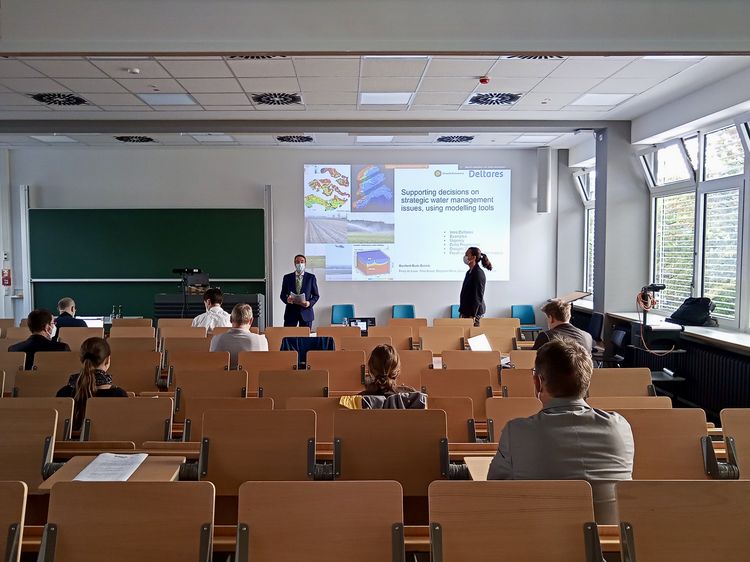
On 17.09.2021, the final conference of the project "SALTSA: Groundwater Salinisation due to Sea Level Rise as a Societal Challenge - the Example of Northwest Germany" took place. SALTSA is an inter- and transdisciplinary project in which a synthesis of societal perceptions and challenges and hydrogeological modelling was carried out. In addition, 15 experts from 14 institutions and authorities related to water management were involved in the project.
The event focused on the presentation of the project results. Thus, the perception and problem awareness of groundwater salinisation and the processes leading to it have increased among most of the participating stakeholders during the project period. The results of the hydrogeological modelling suggest that especially sea level rise and drainage level change will have a strong impact on the future salinisation situation. Future issues mainly relate to a modern, dynamic and holistic water management.
The final conference was rounded off by two other programme items. Gualbert Oude Essink, Dutch expert on groundwater systems (Deltares), gave a keynote on "Supporting decisions on strategic water management issues of stakeholders using modelling tools: on some Dutch cases". Besides vivid examples from the work of Deltares, a Dutch national institute aiming at effective and timely climate impact adaptation and direct involvement in the national policy system, he presented models and also possible adaptation strategies for the Dutch region of Zeeland with regard to groundwater salinisation. The conference was concluded with a lively panel discussion. On the topic "Groundwater salinisation on the North Sea coast - What is the current status? What is the need for knowledge and action?" Uwe Sütering (OOWV), Jörg Elbracht (LBEG) and Godehard Hennies (Wasserverbandstag) gave keynote speeches.
The SALTSA final conference took place in a COVID19-compliant hybrid format. Stakeholders who had worked closely with the project team during the project period were invited to attend. At the same time, the conference was digitally broadcast and 38 interested audience members from academia and practice participated online.
ENaQ project presents itself at the Hellleheide summer festival
Energetisches Nachbarschaftsquartier stellt sich vor
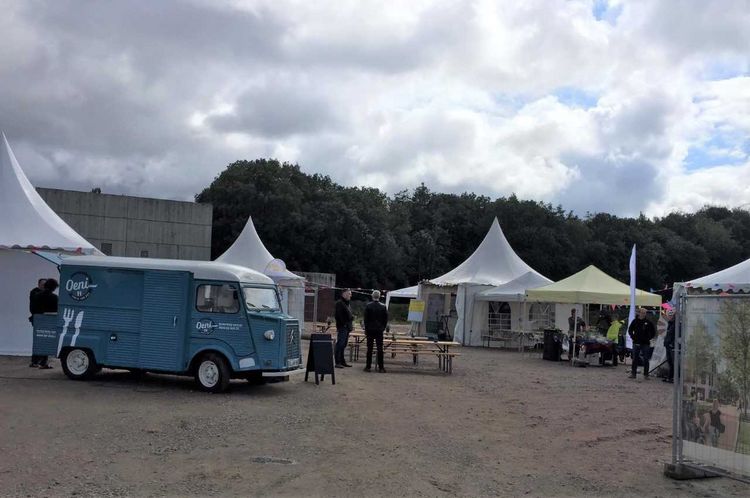
On 27 and 28 August, the Helleheide summer festival took place on the airbase grounds in Oldenburg. Interested visitors were able to see and learn about the technology models, digital business ideas and research results developed by the ENaQ project. In addition to a wealth of information on neighbourly energy trading and communal living in the Helleheide neighbourhood, various formats invited visitors to listen, watch and participate. Despite the capricious weather, more than 150 interested people attended the event.
The ENaQ project is investigating and accompanying the development of the energetic neighbourhood Helleheide on the Fliegerhorst site in the north of Oldenburg until 2023. In addition to a number of other project partners, the Chair of Ecological Economics is involved in the development and evaluation of participation formats. Further information on the project website.
Publication of Adaptiveness: Changing Earth System Governance
Ein Sammelband aus der Projektserie "Earth System Governance"
Rapid and transformative action is more urgently needed than ever before to achieve a just, resilient and environmentally sustainable global society in line with the Sustainable Development Goals of the United Nations. A dynamic governance is necessary to successfully address uncertain and changing conditions. This governance must be responsive and flexible - or in one word:adaptive- on many levels. This book offers an up-to-date look at the conceptual development of the collective term 'adaptiveness' as a core concept in the environmental governance literature, and its application at global, regional and national levels. The politics of adaptiveness, the processes that promote it and its influence on diverse systems are also explored in this book.
Adaptiveness is presented by Riyanti Djalante and Prof. Dr. Bernd Siebenhüner edited. Dr. Nicolas Jager and Julie King are contributing authors.
More information about the book is available at Cambridge University Press.
Below you will find a flyer about the book, including a 20% discount code.
Conclusion of the three-day digital conference on "Dilemmas of Sustainability
As part of the project "Dilemmas of Sustainability between Evaluation and Reflection. Justified Criteria and Guidelines for Sustainability Knowledge", a digital conference on the topic of "Dilemmas of Sustainability" took place at the Carl von Ossietzky University Oldenburg from 9 June 2021 to 11 June 2021.
The conference focused on the following questions and topics:
- Which dilemmas of sustainability become apparent based on which understandings of sustainability in and between different scientific disciplines in the context of research on sustainable development?
- What is the significance of recognising, understanding and dealing with sustainability dilemmas for transformative science?
- What role do methodological approaches, epistemic norms and social values play in this?
- Does the transdisciplinary research approach often used in sustainable development research with its immanent normativities contribute to the formation of dilemmas?
Further information on the conference can be found on the project website.
UOL researchers publish article on Flood Resilience Rose
A team of researchers from the Carl-von-Ossietzki University Oldenburg, consisting of Leena Karrasch, Britta Restemeyer and Thomas Klenke, published an article on flood management in the Journal of Flood Risk Management on 16 May 2021. In the article, the researchers present the "Flood Resilience Rose" - a management tool for harmonising flood protection activities. It was developed to capture the complexity of flood risks, increase flood resilience and support the transformation towards more comprehensive flood risk management.
The research was supported by the European Regional Development Fund.
An information letter from NachDenkstatt e.V.
Get your ticket for this year's NachDenkstatt now!
After a year's forced break, the time has finally come again: the NachDenkstatt will open its doors to you once more. Unfortunately, due to circumstances, we can only make our offer available online. But that shouldn't stop us from spending an exciting weekend with interesting workshops with you.
But what is the NachDenkstatt anyway?
The NachDenkstatt is a workshop weekend organised by students of the University of Oldenburg. The questions we want to work on with you and various experts in the workshops mainly deal with the topic of sustainability, but also with the general question of how we want to live in the future.
What is the schedule of the NachDenkstatt?
The weekend will start on Friday, 11.06.2021 and last until Sunday, 13.06.2021. You will have the opportunity to choose your favourite workshop beforehand. Once you have purchased your ticket, you will be registered for that workshop for the entire weekend and can dive deep into your chosen topic. But don't worry, through our diverse social programme you will also have the opportunity to exchange ideas with other participants about the other workshops.
Why should I buy a ticket?
Unlike other workshops, which usually only last a few hours, with us you will get input from a variety of perspectives and can thus dive deeper into the respective topic. To make sure you're well-fed for the weekend, we'll also provide you with a goodie bag that includes some snacks for you. In addition, we will do our best to bring the spirit of the "normal" events to life online and thus offer you the opportunity to make new contacts during this difficult time.
Where can I get my ticket and what does it cost?
You can get your ticket now at this link: nachdenkstatt.de/tickets/
It pays to be quick: Not only do you still have the opportunity to register for the workshop of your choice, but you can also pay the Early Bird price of only 4,-€.
For more information on the individual workshops and the NachDenkstatt itself, just check out our website(nachdenkstatt.de/) and our Instagram channel(www.instagram.com/nachdenkstatt/). There you will find all the information you need.
We are already looking forward to welcoming you all to the NachDenkstatt.
Your NachDenkstatt team.
Lecture by Prof. Dr. Bernd Siebenhüner and apl. Prof. Dr. Ulrich Scheele on the topic of Climate Neutral Oldenburg
Ulrich Scheele from the Working Group for Regional Structural and Environmental Research (ARSU) and Bernd Siebenhüner gave a presentation on the topic of "Climate Neutral Oldenburg" at a special meeting of the City of Oldenburg's Environmental Committee on 25 March 2021. In their presentation, they emphasised the urgency of climate protection measures and the transformation to climate neutrality and the involvement of all key stakeholders.
Lecture by Prof. Dr. Bernd Siebenhüner at the project day for pupils on the topic of ClimateKnowledge
On 25 March 2021, Bernd Siebenhüner gave a lecture on "How are climate change and economic growth connected?" at the online project day "KlimaWissen 2021" initiated by Fridays for Future. The aim of the project day was to give pupils in grades 9 to 13 from the Northwest region the opportunity to talk to experts about climate change, climate impacts and climate protection.
Open letter to the German Foreign Minister Heiko Maas
In the following open letter to the German Foreign Minister Heiko Maas, the East and South African-German Centre of Excellence for Educational Research Methdologies and Mangement (CERM-ESA) appeals for the patent release of COVID-19 vaccines:
Results conference of the BREsilient research project
Prolonged periods of drought and heat, flooding due to heavy rain and storm surges and the resulting damage: the consequences of climate change are already affecting Bremen today. What suitable adaptation measures might look like in the future has been investigated over the past three years in the joint project "Climate Resilient City of the Future Bremen" (BREsilient), led by the Senator for Climate Protection, Environment, Mobility, Urban Development and Housing (SKUMS) of the Free Hanseatic City of Bremen. The BREsilient project is thus one of many building blocks in Bremen's climate adaptation strategy. In an online conference with Mayor and Climate Protection Senator Dr Maike Schaefer and around 140 participants on 9 March 2021, those involved took stock.
Following a review of the project period, the results from the model areas were presented in topic-specific workshops. The focus was on planned measures for a proposed implementation and continuation phase of the BREsilient project.
However, the conference also looked beyond the results of BREsilient to other activities and aspects of climate adaptation in Bremen. In a panel discussion, Senator Dr. Maike Schaefer, Oda Keppler from the BMBF, Cornelia Rösler from the German Institute of Urban Affairs and scientist Dr. Torsten Grothmann from the University of Oldenburg discussed the question "How climate resilient is Bremen?
2020
New SEM cohort 2020
The Chair of Ecological Economics welcomes the new Master's students of the Sustainability Economics and Management (SEM) programme to the University of Oldenburg. We wish you a wonderful introductory week and a successful start to the lecture period - despite the current restrictions due to the Corona situation.
One more note: The university e-mail addresses can be used from the time of enrolment, via which relevant information for the start of studies as well as the orientation week can already be received.
Project now also launched for "WAKOS - Water on the coasts of East Frisia: basis for customised climate services for adaptation"
After the start of the project Good Coast Lower Saxony on 01.01., the collaborative project WAKOS could also start on 01.06. We can thus welcome two new doctoral students to our team - in addition to Evke Schulte-Güstenbergwho started in April in the project Good Coast project, Annalena Schoppe is in charge of Annalena Schoppe is in charge of the WAKOS project.
The focus of WAKOS is the production of regional climate data or climate scenarios, which are to serve as a basis for the discussion of socially accepted need for action in coastal protection. The new joint project is being carried out in cooperation with the Helmholtz Centre Geesthacht (HZG), the NLWKN - Coastal Research Centre, the University of Hamburg, the Jade University of Applied Sciences Wilhelmshaven/Oldenburg/Elsfleth and the Carl von Ossietzky University Oldenburg. The project is funded by the Federal Ministry of Education and Research (BMBF) and amounts to 2.29 million euros. The focus of the sub-project, which is led by Dr. Leena Karrasch and Prof. Dr. Bernd Siebenhüner is the identification of concepts for assessing regional adaptation capacity and need, which can be applied in the model region and are socially accepted, so that the resilience of the model region can ultimately be strengthened.
www.fona.de/de/massnahmen/foerdermassnahmen/RegIKlim/wakos.php
Press release follows
To the WAKOS project page
To the Good Coast project page
IPCC takes up article by Dr Leena Karrasch
In the IPCC Special Report on the Ocean and Cryosphere in a Changing Climate".which deals in particular with the consequences of climate change for low-lying islands, marine ecosystems, coasts and communities, as well as risk management and adaptation, the research of Oldenburg University is also heard. In the chapter "Integrative Cross-Chapter Box on Low-lying Islands and Coasts", an article by Dr. Leena KarraschMartin Maier, Michael Kleyer and Thomas Klenke is cited. Participatory processes, joint landscape planning and co-design of ecosystem-based management are particularly important for involving society in the development of future adaptation measures in low-lying coastal areas, as examples on the North Sea coast also show (Karrasch et al. 2017, p. 666).
2019
Gamification of Interdisciplinary Higher Education" project approved
As part of the Higher Education Package 2020 and the call for proposals "Innovative Teaching and Learning Concepts: Innovation plus", the project "Gamification of Interdisciplinary Higher Education" from Dr. Thomas Klenke, Dr. Leena Karrasch and Malena Ripken with 48.800€. The aim of the project is to further develop the module "Planning and Management of Coastal Zones and Sea Basins" with the approach of serious gaming. The aim is to (1) develop concepts for building up and improving the "game-based" teaching content, (2) use and reflect on "serious games" continuously in the course of the module, (3) integrate external international guest lecturers and practice partners, and (4) carry out problem-based and self-directed, research-based learning in order to build up action competences for sustainable development in coastal zones and the European seas.
New research project: Good Coast Lower Saxony
Großer Erfolg für das Konsortium der Universitäten Hannover, Oldenburg und Braunschweig in der aktuellen Bewilligungsrunde des Niedersächsischen Vorab
Ecosystem-strengthening coastal protection on the coast of Lower Saxony: this is the topic of a new research network of Leibniz Universität Hannover, Carl von Ossietzky Universität Oldenburg and Technische Universität Braunschweig. The network is funded with 2.5 million euros from the Volkswagen Foundation's Lower Saxony Advance. In real laboratories, the coastal research institutes will methodically work together with local actors to develop and test possibilities for action and management for ecosystem-strengthening coastal protection. One sub-project is being led by Dr. Leena Karrasch and Prof. Bernd Siebenhüner are in charge.
To the announcement of the Lower Saxony Ministry for Science and Culture
Reference to lectures by Prof. Dr. Bernd Siebenhüner on the topic of 'Science and the Climate Crisis'.
In December Prof. Dr. Bernd Siebenhüner will speak will speak at two events on the topic of the climate crisis.
On 5 December at 6 p.m. there will be an event in the foyer of A14 on the topic of internationalisation and sustainability . Here, Mr Siebenhüner will speak and discuss the following questions together with Prof. Dr Hans Gerd Nothwang (FK VI), Prof. Dr Joachim Peinke (FK V) and Prof. Dr Gabriele Gerlach (FK V):
- What are the consequences of internationalisation for the environment?
- What can the university and each individual do to reduceCO2 emissions- for example, during business trips?
- What support do we expect from politics?
On 09.12. there will be an evening event on the topic of Fake Science? - Why we can trust the IPCC (Intergovernmental Panel on Climate Change) and how climate research on ocean-atmosphere interaction works will take place in the BIS hall. In his input, Bernd Siebenhüner will explain how the reports of the Intergovernmental Panel on Climate Change (IPCC) come about and their political significance. Oliver Wurl will be joined live from the research vessel "Falkor", on which he is studying the interactions between oceans and the atmosphere using the Pacific as an example. He will show how this works in practice in the video feed. The event starts at 19:30.
Both events take place within the framework of Scientists for Future.
BREsilient Workshop Series
On 07 November 2019, the first of three workshops in the series on flood prevention took place in the Pauliner Marsch.
The Pauliner Marsch and the allotment garden area "Im Suhrfelde" are of great importance for local recreation, for sporting activities and as home to associations for the local people and beyond. The attractive location directly on the Weser is a special attraction, but also poses risks. Heavy rainfall as well as storm surges on the North Sea or snowmelt upstream can lead to large-scale flooding here. That is why the entire area is designated as a floodplain.
In a three-part workshop series, citizens, associations and actors from politics and administration are to jointly develop adaptation measures for flood prevention for the Pauliner Marsch and "Im Suhrfelde". The first workshop "Flood prevention: analyses & discussion of adaptation options" took place on 7 November from 5 to 8 p.m. at the Weserterrassen community centre.
Hendrik Wolter awarded the Prize for Teaching
Together with Prof. Dr. Stefanie Sievers-Glotzbach and Prof. Dr. Dirk Albach was Hendrik Wolter on 28.11.2019 in the category "Research-based learning" with the Teaching Award award. In the interdisciplinary course "Practical Project - Which Variety(ies) of the Future Do We Need?" students dealt with crops with regard to organic farming and developed their own research project from this. The test achievement was not only the result of the work, but the entire scientific process. With the award, the jury particularly appreciated the constructive and appreciative feedback and error culture between the teachers and the students as well as between the students themselves.
'Serious Gaming' - WCM and SEM Excursion
On Monday, 25.11., the WCM- and SEM-students of the module Planning and Management of Coastal Zones and Sea Basins went to Leeuwarden. During this excursion, led by Malena Ripken and Dr. Leena Karraschthey took part in the serious game "MSP Challenge" together with Dutch students. They exchanged ideas, tested new approaches and gained an overview of the complexity of various activities in coastal and marine areas. The international exchange with other students in a similar subject area was of particular importance.
Fridays for Future, Consumption and the Impact of Social Media - Prof. Dr. Bernd Siebenhüner together with Prof. Dr. Martin Heidenreich in the NWZ
Together with Prof. Dr. Heidenreich discussed Prof. Dr. Bernd Siebenhüner about the Fridays for Future activists, who are also very active in Oldenburg, and the increasing dynamics of the movement . Other topics were consumption and sensitivity when it comes to renunciation, as well as the role of social media on the topic.
1 evening - 7 pubs - 14 x science
With the slogan "1 evening - 7 pubs - 14 x science", scientists from various research institutions and different disciplines moved into Oldenburg's city centre on 24 October 19. Two short technical papers were presented in each of seven bars and pubs. Under the exciting title "Changing tides and what climate adaptation has to do with a spilled beer" explained Dr. Leena Karraschexplained how a colourful bouquet of protection, prevention, precaution and reconstruction measures can contribute to climate adaptation.
More information at FRAMES.
Registration for the final event of the EGON project
On 14.11.2019 from 09:30 to 17:00 in Jork, the final event of the research project 'EGON - Development of organically bred fruit varieties in common property-based initiativeswill take place. At the event, the project partners (from the Chair of Ecological Economics Hendrik Wolter) will discuss the following questions, among others:
- Which initial varieties are particularly suitable for organic breeding?
- What market developments is organic fruit breeding facing and what new business models are possible?
- Should more players participate in fruit breeding and if so, how?
You can find the registration form here.
You can find the programme of the event here.
"From brain to cock- knowledge freshly tapped" on 25 October - participation by Dr Leena Karrasch
On 24 October 2019, the event "From brain to tap - knowledge freshly tapped" will take place in various pubs and restaurants in Oldenburg. Guests will have the opportunity to get to know the people behind science and research in a relaxed atmosphere and ask questions themselves. Those who wish can join in the discussion afterwards or change pubs to listen to another contribution. Admission is free.
Dr. Leena Karrasch will speak at the 'Weinbar Artischoke' at 8.45 pm on the topic of "Changing tides and what climate adaptation has to do with a spilt beer".
The full programme and more information about the event can be found here.
Dialogue forum Fliegerhorst | residential district. together. design
Bürgerinnen und Bürger können sich an Quartiersentwicklung beteiligen
The Fliegerhorst Energy Neighbourhood project invites you to the Fliegerhorst Dialogue Forum on Saturday, 14 September 2019 from 10 a.m. to 6 p.m. at the EWE Forum Alte Fleiwa. 21 project participants from business, administration and science are planning a climate-friendly and innovative neighbourhood quarter on part of the air base. Living space for around 300 people will be created on four hectares. The neighbourhood development is to be optimally oriented towards the needs of the future residents. The Dialogforum Fliegerhorst therefore offers Oldenburg residents the opportunity to contribute their ideas and wishes. A varied programme is on offer for the whole family. The visit to the event can be arranged flexibly and individually.
Admission is free of charge. Registration is requested at: www.enaq-fliegerhorst.de/dialogforum A detailed programme for the event can be found on the website.
New publication by Maren Wesselow
New publication by Maren Wesselow:
Wesselow M (2019). "In Town, Everyone Is on Their Own." Building Informal Risk Management Arrangements Among Urban Farmers in Dar es Salaam. Trialog 134, a Journal for Planning and Building in a Global Context. Vol. 3/2018, p 4 - 8.
ECOSOLA Final Workshop
On 25 September, the final workshop of the collaborative project ECOSOLA will take place near Dar es Salaam/Tanzania. On this occasion, the results of the three-year project will be presented to numerous representatives of local politics, farmers' associations and partner institutes. Furthermore, it is planned to discuss problems and opportunities of urban planning in and around Dar es Salaam on the basis of a practical planning task. On 26 September, an exhibition opening will take place in the district administration of Kibaha (near Dar es Salaam). In order to make the project results accessible, informative posters as well as a 3D model of an exemplary city plan for the region (see photo) will be presented. The exhibition will be on display at the district administration for a few more weeks and will be open to the public.
LIPSINDAR Stakeholder Workshop in Dar es Salaam
From 12 to 14 June 2019, the LIPSINDAR project held the Sustainable Mobility Stakeholder Workshop in Dar es Salaam, Tanzania.
Participation of Prof. Dr. Siebenhüner in panel discussion at the Bavarian Academy of Sciences and Humanities
Prof. Dr. Bernd Siebenhüner took part in a panel discussion on "Alpine Club Culture - Another Economy?" at the Bavarian Academy of Sciences and Humanities on 27.6.19. The event took place as part of the event series "The Alps. The Endangered Dream" series of events organised by the German Alpine Association on the occasion of its 150th anniversary. The topic was the economic model of the Alpine Club and its refuges. With its refuges open to all and its network of paths accessible to everyone, the Alpine Club established a special form of household organisation based on solidarity. This solidarity community has functioned amazingly successfully for 150 years as a non-market structure. The discussion showed that in view of the Alpine Club's decision not to expand the huts and trails any further, the current influx of visitors is more likely to lead to quantity control via increasingly early registrations than to price control.
10th Trilateral Research Workshop
The 10th Trilateral Research Workshop "Sustainable development in the Wadden Sea region: Environmental, social and economic perspectives" took place from 5 to 7 June. The universities of Oldenburg, Bremen, Hamburg, Groningen and Southern Denmark were involved.
A colourful programme was organised to celebrate the 10th anniversary. Jürgen Rahmel (Head of the Biosphere Reserve Department, Lower Saxony Wadden Sea National Park Authority) inspired the international students and scientists with an excellent lecture on the current development of the biosphere reserve on the North Sea coast of North Rhine-Westphalia. Afterwards, the complex challenges of marine spatial planning were conveyed in a playful way with the serious game "MSP Challenge". The students presented a colourful variety of master's and doctoral thesis topics, all with one thing in common: they deal with sustainable development in the Wadden Sea region. The topics presented ranged from comparative studies of different landscapes and protected areas, plastic waste, demographic change to new approaches of car-sharing or animal tourism. The workshop was rounded off with an excursion to Bad Zwischenahn. In wonderful weather, the participants got to know the community and its development potential, presented by the mayor Dr. Arno Schilling. At the Lehr- und Versuchsanstalt für Gartenbau Bad Zwischenahn, Heinrich Beltz vividly explained how plants can be cultivated sustainably and how to deal with the challenges of climate change.
The 11th Trilateral Research Workshop will take place in Groningen in 2020.
New publications from the Chair
New publications by Dr Lars Hochmann:
Hochmann, Lars; Graupe, Silja; Korbun, Thomas; Panther, Stephan; Schneidewind, Uwe (eds., 2019): Possibility Science. Economics with a sense of possibility. Marburg: Metropolis.
www.metropolis-verlag.de/Moeglichkeitswissenschaften/1378/book.do
Barde, Martin; Hochmann, Lars (2019): Streuobstwirtschaft. Towards a new socio-ecological entrepreneurship. Munich: oekom.
www.oekom.de/nc/buecher/gesamtprogramm/buch/streuobstwirtschaft.html
New publication by Dr. Leena Karrasch:
Karrasch, L., T. Klenke and M. Kleyer (2019): Land-use elements and attributed ecosystem services: an archetype approach to land-use evaluation at the German North Sea coast. Ecology and Society 24 (2):13. [online] URL: www.ecologyandsociety.org/vol24/iss2/art13/
New publication by Hendrik Wolter:
Wolter, H., Sievers-Glotzbach, S. (2019): Bridging traditional and new commons: The case of fruit breeding. International Journal of the Commons, 13 (1), pp. 303-328. [online] URL: www.thecommonsjournal.org/articles/10.18352/ijc.869/
New publication by alumna Klara Winkler:
Winkler, K.J. (2019). The implementation of the conceptual shift in conservation: pathways of three German UNESCO biosphere reserves, Ecosystems and People, 15:1, 173-180.
LIPSINDAR Stakeholder Workshop in Dar es Salaam
From 12 to 14 June 2019, a stakeholder workshop on sustainable mobility will be held in the Tanzanian metropolis of Dar es Salaam as part of the project. The workshop will focus on the recently introduced rapid bus system in Dar es Salaam.
The aim of the LIPSINDAR project is to network the three BMBF research projects ECOSOLA, AfriCity and GOPLAREA. At the same time, potentials and problems of the rapid bus system for the design of sustainable mobility in Dar es Salaam are to be investigated in a joint pilot study. The three-day workshop will be attended not only by German and Tanzanian members of the three research projects, but also by urban planners and representatives of the rapid bus system.
Kick-off meeting in the Dilemmata project
On 06 May 2019, the kick-off event for the project 'Dilemmas of Sustainability’ took place at the CvO University Oldenburg. Together with all project partners of ISOE, the Technical University of Braunschweig and the University of Passau, the further procedure and the common working basis for the joint project were discussed.
OptiWohn" project launch
Since 1 May 2019, the research project 'OptiWohn - Neighbourhood-specific exploration and development of innovative strategies for the optimised use of living space' with a kick-off meeting of the project partners on 20 May in Berlin. Participating is Daniel Fuhrhop for the field of ecological economics.
OptiWohn mainly advises senior citizens on what they can do with large flats or houses - conversion, subletting or relocation. This is being tested in three model cities: Göttingen, Cologne and Tübingen. Other partners in the BMBF project are the Wuppertal Institute for Climate, Environment and Energy and werk.um Architekten Darmstadt. The focus of the Oldenburg sub-project is to investigate the placement agencies of "Wohnen für Hilfe" (living for help): young people, mostly students, live with older people but do not pay sub-rent in euros but in help with household chores, shopping or gardening. Daniel Fuhrhop examines how the placement offices work, what the success factors and obstacles are, and what the ecological and economic significance is of creating living space in this way and making new construction superfluous.
New publication Dr Torsten Grothmann
New publication by Dr. Torsten Grothmann:
Sander, K., Hoffmann, E. & Grothmann, T. (2019). Climate precaution offer bundles support offers for precaution for health-related climate risks. UMID - Umwelt + Mensch Informationsdienst 1/2019, pp. 61-68. www.umweltbundesamt.de/sites/default/files/medien/4031/publikationen/internetversion-01-2019.pdf
Further education for pupils on the topic of "Coastal protection in the face of climate change
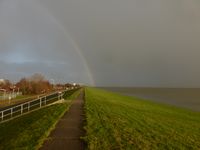
On 4 April, the senior geography class of the Johannes-Althusius-Gymnasium Emden visited the University of Oldenburg. Although the students live in the marshes, coastal protection in the context of climate change is new territory for them. Visibly interested, they discussed with Leena Karrasch using the example of the projects COMTESS and SALTSA projects, they discussed the influences of climate change on the low-lying coastal region, different forms of coastal protection and explored the question of what sustainability means in this context.
Advanced study counselling
Since 01.04.2019, the student advisory service for the Master's degree in Sustainability Economics and Managementhas consisted of a two-member team: Hendrik Wolter & Alkje Wegner. Contact address: sem@uni-oldenburg.de.
Office hours are:
Tuesdays, 11:30-12:30 (Hendrik Wolter)
Wednesdays, 08:30-9:30 (Alkje Wegner)
Start of the project "Dilemmas of Sustainability
On 01.04. the research project 'Dilemmas of sustainability between evaluation and reflection’ was launched. The project examines the various objectives, ideas and forms of knowledge that are associated with the term 'sustainability' and the resulting dilemmas. The project is supervised by the doctoral students Sophie Berg and Ann-Kristin Müller.
Partner meeting in the BREsilient project
In the research project 'BREsilient - Climate Resistant City of the Future Bremen', a partner meeting took place on 18 and 19 March. In addition, a workshop was held with citizens in the Blumenthaler Aue on 27 February 2019 on the topic of "Heavy rain precautions: information & exchange".

